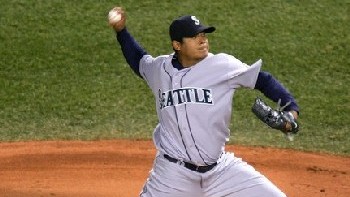
For a guy who is reputed to have a little chance to win the Cy Young Award, Felix Hernandez is putting up a splendid argument.
The Mariners star came into Friday’s start against Texas having allowed no earned runs in five of his last eight starts. You just don’t pitch better than that. And no one is keeping pace with him. He’s moved into the AL lead in innings pitched (225.2), ERA (2.39) and strikeouts (214).
But he’s only 11-11 thanks to a moribund Seattle offense.
“It’s not easy to do what Felix is doing,” right fielder Ichiro Suzuki said. “Every time he goes out there, no matter what, we know we have a chance to win.”
That’s saying something, given that the Mariners are last in the American League West and have been for months, thanks to an offense that likely will be the worst in club history.
“He’s having just an incredible year, and it’s a year when we haven’t given him a ton of support,” DH Russell Branyan said. “It’s one of those bizarre years when we can’t score for him.
“But he still goes out and shoves it up people’s butts, game after game.”
The question is whether the ultimate pitching honor, the Cy Young, is about pitching or winning.
The argument for years about baseball’s Gold Glove awards has been that the winners always seem to be players who could hit, too, even though that’s not part of the qualification for the award.
The question now is whether the pitching award is heading down a similar path.
Some pitchers are buoyed by great offense. They’re more likely to get the nod than pitchers who have to beg for runs from anemic offenses.
In the American League in 2010, we have one of the best-ever have vs. have-not matchups.
Yankees lefty C.C. Sabathia, 2010’s first 19-game winner, is on the brink of his second Cy Young win in four years. Should he be?
If you are talking about pure pitching, then Sabathia (19 wins, a 3.03 ERA, 179 strikeouts in 217 innings) has had a fine year. Head west and north, though, and you come to Hernandez, who is having a lights-out year.
But managed just his 12th win Friday, which included seven no-hit innings. Pitching for the Mariners will do that to you, even when you lead the league in every significant category for starters.
As Branyan put it, “He’s been Cy Young-incredible.”
In Hernandez’s 11 losses, the Mariners have scored seven runs when he’s been in the game. Even Young himself would be hard-pressed to win under those conditions.
Contrast his run support to that of Sabathia, who has the benefit of playing for a team that is first in the league in runs scored to the Mariners’ last. Not only have Yankees hitters provided Sabathia with 172 runs worth of support (that’s 5.55 runs for each of his 31 starts), but the Yankees scored more runs for Sabathia by the end of June (94) than the Mariners scored for Hernandez through the end of August (92).
The Mariners have averaged 3.17 runs per game for each of Hernandez’s first 31 starts, meaning that Sabathia has a buffer of more than 2½ runs per start before he ever takes the mound. That’s going to add up to a lot more wins.
Seattle has nine games in which it has scored either one or no runs when Hernandez started. New York has had four games offering such little support to Sabathia.
“There are a lot of pitchers who pitch well when their teams are going good,” Ichiro said. “What’s tough is to do it in this situation like we have where he’s not getting any run support.
“Should Felix be the Cy Young winner? That’s not for me to say. He’s got the numbers to do it, except for the wins. Unfortunately, I don’t have the right to choose.”
Not to decry anything Sabathia’s done, because winning games is the team priority, and he’s won more than anybody. It’s just not evident statistically that he’s pitched better, which is supposed to be what the Cy Young is about.
Curiously, Hernandez was on the other end of the debate last year well, his backers were; he’s willing to take things pretty much as they come when he tied for the league lead in wins (19), finished second in ERA (2.49) and was 1.2 innings shy of leading the league in innings pitched.
Even then, however, the scales weren’t as out of balance as they are in 2010. Hernandez finished second to Zack Greinke of the Royals, but even a bad Kansas City team scored 3.72 runs for Greinke in his starts. He had only three fewer wins (16 to 19) than Hernandez.
It helped Greinke’s cause that no pitcher won 20 games. He also had a fast start that generated early buzz, and he won the ERA title in dominating fashion at 2.16.
The question is how the voters two members of the Baseball Writers Association of America (BBWAA) from each American League city will balance the cases of Hernandez and Sabathia.
There are other candidates: ERA runner-up Chad Buchholz of the Red Sox (15 wins and a 2.53 ERA in 151.2 innings), 16-game winner Trevor Cahill of the A’s (third in ERA at 2.61) and 17-game winner David Price (the fourth-best ERA of 2.75) have considerable support, too.
John Hickey is a Senior MLB Writer for AOL FanHouse (www.fanhouse.com)
